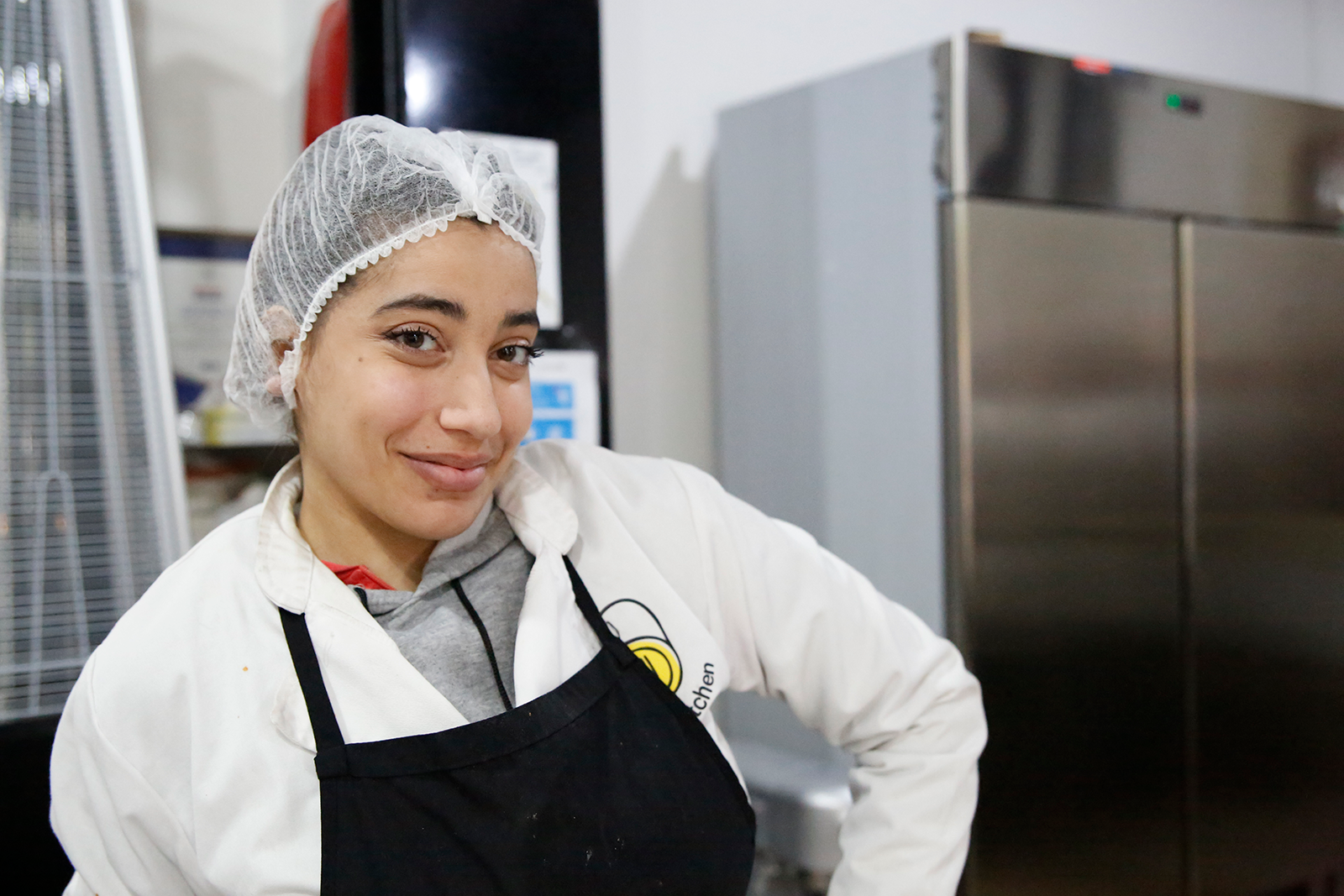From Where I Stand: “We, women with disabilities, have the right to live and deserve equal chances.”
Date:
Every morning at 08:00 AM, the smell of freshly baked pastries permeates the air of the Mar Mikhael neighborhood in Beirut, Lebanon. The scent can be traced to the Access Kitchen, a women-led community kitchen, where 60 women living with disabilities are busy preparing hot meals for underserved families living in the local community.
Marina Khamouny, 24, is among the bustle women in the production line, smoothing Za’atar on top of freshly rolled pastry dough. Marina was born with a condition of neural tube defect (NTD) called Spina Bifida, a congenital disability. At birth, upon finding out about her condition, her parents admitted her to a Mother Teresa Orphanage in Fanar, 10.8km from Beirut. Despite the challenges she has faced in her life, Marina remains optimistic for the future. Through her work at the Access Kitchen, she has renewed her sense of self-worth and drive to advocate for women and persons with disabilities rights.

 The day I was born, I was placed into an orphanage. I lived there all of my childhood until I turned 17 years old. I had to be transferred because of my age to an elderly shelter that accommodated for persons living with disabilities. This move was difficult for me, I was surrounded by people who were much older than me, and I could no longer continue my education. I began to suffer from severe depression, and three years later, I was granted leave from the residence.
The day I was born, I was placed into an orphanage. I lived there all of my childhood until I turned 17 years old. I had to be transferred because of my age to an elderly shelter that accommodated for persons living with disabilities. This move was difficult for me, I was surrounded by people who were much older than me, and I could no longer continue my education. I began to suffer from severe depression, and three years later, I was granted leave from the residence.
After leaving the elderly home, I enrolled in the Kafaat Institute, an education organization for persons with disabilities, where I studied interior architecture. Being around people my age and learning new skills made me feel productive, and my mental health improved.
Despite my growth, I always had so many questions in the back of my mind about who I was and the life I could have had if my family had been there. Even when I was younger, I would ask myself: “Why me? Why am I here? Why am I not living with my parents?”
Deep down, I knew that my parents did not welcome the thought of who I am as a person, but I was desperate to build a relationship with them. After regaining some confidence, I decided to knock on their door, hoping that they would see the person I am now, see that I too am normal, and love me. Their response was the complete opposite.
But I did not give up. I started looking for jobs so I could become independent. I contacted the Lebanese Union for People with Physical Disability (LUPD), and I got the opportunity to become an assistant chef in the Access Kitchen.
Growing up in shelters, I never had a chance to cook or even hold a knife. Someone would always bring me food. The idea was scary, but I decided to give it a try. I work hard in the kitchen, tasked to prepare daily hot meals for vulnerable community members. The chef and my coworkers encouraged me to learn new things. Whenever I tell them I cannot do something, like seasoning a hot pot or preparing stuffed vine leaves, they inspire me to try. I can now prepare kibbeh! This may not be considered an achievement to most, but it is to me.
Eight months have passed, and I still look forward to coming to the community kitchen; I do not skip a day. We created this inclusive and safe environment that fits us all. It is not a job; it is a home. I became more confident, independent, and content with life. I still remember my heart racing when I got my first paycheck, and the first thing I did with it was to search for my own apartment where I can cook, clean and care for myself.
Society treats us, women and persons with disabilities as if we are an abomination or a shameful sin. I believed this idea for a long time and thought that I could not amount to anything. Working with Access Kitchen proved them and myself wrong.
Now, I no longer let anyone make me feel any less than a successful woman. I tell everyone living a similar life to mine to ignore anyone who tells us we do not belong to society. We have the right to live and deserve equal chances.”
The Access Kitchen is led under the project entitled, “Addressing escalating gender-sensitive socio-economic needs by supporting women’s presence in the labor market,” led by UN Women in partnership with the Lebanese Union for People with Physical Disabilities (LUPD) and generously supported by the Government of Japan.
Marina is one of 140 women working at established community kitchens in Beirut, Tripoli, Saida, and Beqaa, serving hot meals to underserved communities. Funded by the Government of Japan, the community kitchens aim to maintain and enhance women’s presence in the labor market by addressing emerging socio-economical needs and reducing food insecurity for marginalized women, with a focus on persons with disabilities and the elderly.